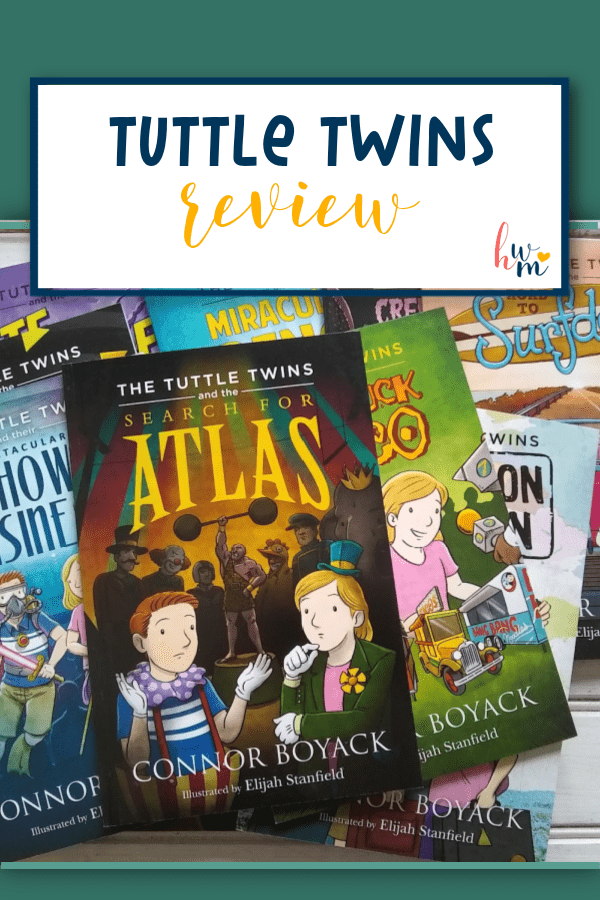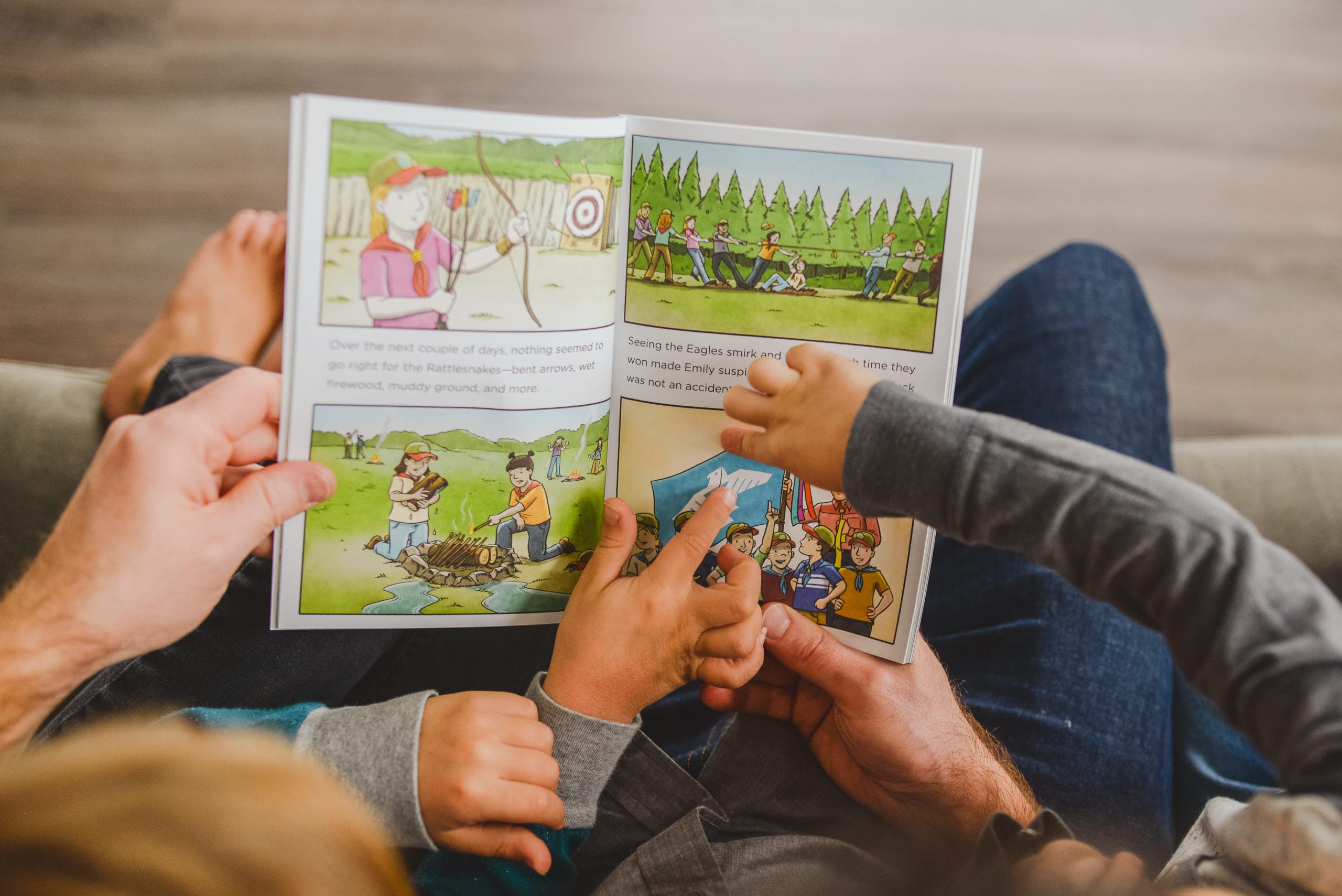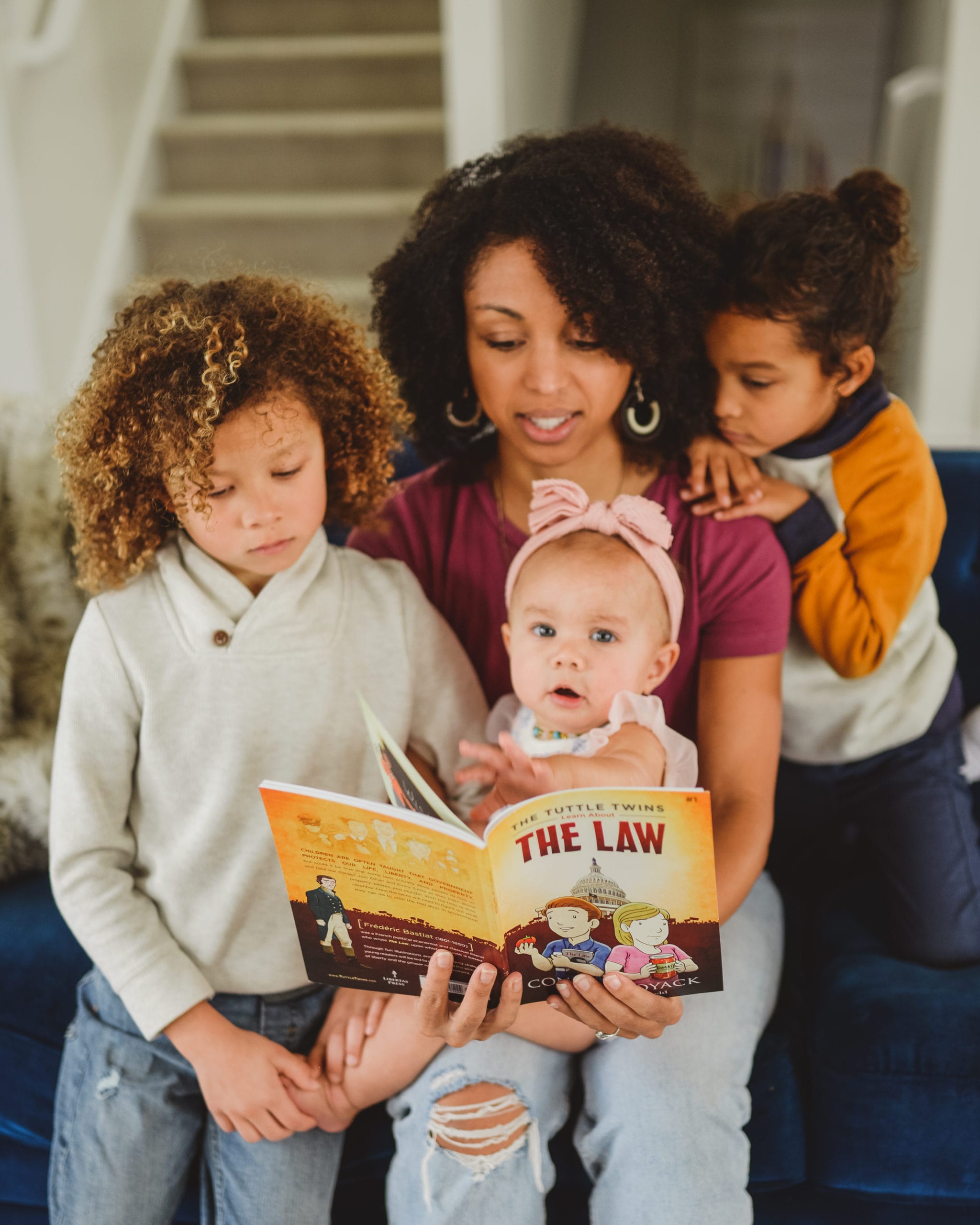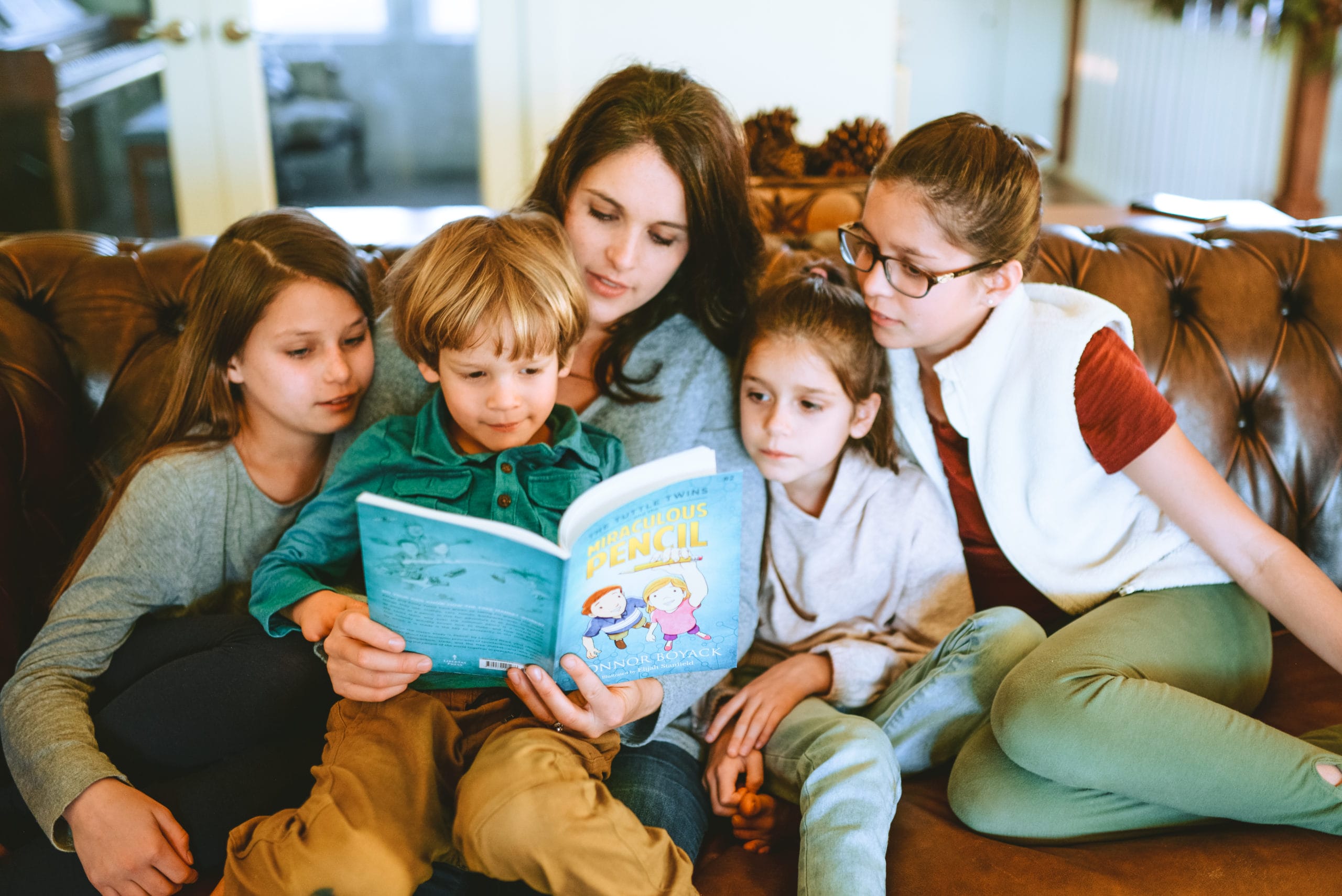Want to know what the Tuttle Twins books teach? What is their bias or viewpoint? Are they worth buying? Here’s an inside peek and review plus our opinion as a conservative Christian homeschooling family.

My posts contain affiliate links.
What are the Tuttle Twins Books?
If you’ve ever wanted a resource to help teach your elementary kids about the principles of liberty, the proper role of government, and the free market, then you’re in luck! The Tuttle Twins book series will help you teach your kids about economics in a super fun way.
And the reason why I think these books are so valuable is that the topic of economics and government can sometimes seem boring. But these kids books simplify complex ideas from economists, historians, and professors – and make it fun!
Created for kids in the ages 5-11 range, they are sturdy paperback books with a nice-sized font and engaging illustrations.
Twins Ethan and Emily have real-life adventures which teach your kids valuable economic lessons and consequences.
You can buy them all in a bundle deal on their site. When we purchased, there were 11 books in all.
My six-year-old was able to read them by herself and loved them! My twelve-year-old also read them all and was excited to tell me all about what he had learned.

Who’s the Author?
Connor Boyack is president of Libertas Institute, a free market think tank in Utah. He is the author of over a dozen books on politics, education, and culture, along with hundreds of columns and articles championing individual liberty. He is also president The Association for Teaching Kids Economics, a national non-profit helping K-8 students learn free market ideas.
You can hear my interview with Connor on episode #62 of the Homeschool with Moxie podcast.
We discuss The Tuttle Twins series along with the ideas in his book Passion-Driven Education.
So, I know you’re wondering which economic perspective and political bias Connor is coming from when he writes these children’s books. And those are essential questions to ask! So, here’s what you’ll want to know.
Economic School of Thought
The Tuttle Twins books are written from the perspective of the Austrian School of Economics. This school of economic thought was founded in by scholars over 150 years ago.
In short, the Austrian economics believes that the free market is best left alone from government interference. In contrast, Keynesian economics endorses government intervention in the form of market regulation.
Political Bias
The Tuttle Twins books are written from a Libertarian point of view. Our family has a conservative bent, but we find these books to be perfectly fine for our kids to read. If your family is from a liberal persuasion, you will not like these books.
Yes, every book does have a bias. There is nothing completely neutral. Everyone has a worldview, so as long as you know the worldview or bias of the author, you’ll be able to have discussions with your kids about the material.
Are these books religious?
While the author is a practicing Mormon, there is no Mormon theology or doctrine presented in these books. These books are not overtly religious. The only mention of anything religious is the foundational belief that rights come from God and not the government.
Can I Get An Inside Peek?
How Do They Teach Economics to Kids?
Connor Boyack takes complex ideas from books written for adult readers and distills them down into principles that your kids can understand. Because they’re written with a fun and relatable storyline, your kids will be drawn right into the action and learn economic principles too!
Here’s an example of the “real-life” books and the corresponding title from The Tuttle Twins series.
The Education Vacation is based off the best-selling book, The Underground History of American Education, by John Taylor Gatto. In this adventure, Emily & Ethan learn that “education works best when we have the freedom to discover our interests and develop our abilities, rather than being shaped into what somebody else wants.”

The Food Truck Fiasco is inspired by Henry Hazlitt’s Economics in One Lesson. The Tuttle Twins learn how government protectionism harms the economy and how one person can make a difference.
There are eleven total books in the series right now, taking their lessons from books such as The Creature from Jekyll Island by G. Edward Griffin, Competition & Entrepreneurship by Israel M. Kirzner, A Foreign Policy of Freedom by Ron Paul, The Law by Frederic Bastiat, and more!
There are even downloadable PDF workbooks available for you to extend the learning. Or, if you’d like a weekly economics lesson sent directly to your inbox, you can sign-up for the Free Market Rules curriculum. So you could conceivably make a year-long study out of this material.
A Short Overview of Each Tuttle Twins Children’s Book
The Tuttle Twins Learn About The Law

This book is based off of The Law, written by French political economist Frederic Bastiat in 1850. Ethan and Emily Tuttle learn that doing wrong is always wrong, even if it’s done by the government in the name of the law. With rights come responsibility. The Tuttle Twins learn about the proper role of government and what a true law really is.
“But how is this legal plunder to be identified? Quite simply. See if the law takes from some persons what belongs to them and gives it to other persons to whom it does not belong. See if the law benefits one citizen at the expense of another by doing what the citizen himself cannot do without committing a crime.”
The Tuttle Twins and the Miraculous Pencil

Based on the classic essay, “I, Pencil” by Leonard Read, this book follows Emily and Ethan to a pencil factory where they learn about economic principles such as division of labor, competition, trade, and the free market.
The Tuttle Twins and the Creature from Jekyll Island
Emily and Ethan learn about the mysterious creature that is stealing their grandparent’s savings. In this book based on G. Edward Griffin’s The Creature from Jekyll Island, kids learn about the history of money, banking, history, and savings while selling honey at an amusement park.

The Tuttle Twins and the Food Truck Fiasco
The Tuttle Twins and their food truck friends learn that the government can wreak havoc on the local economy through unfair regulations leading to less options for customers. When Ethan and Emily see a local restaurant try to use the power of the government to try to shut down their food truck friends, they get to work . Based on Henry Hazlitt’s Economics in One Lesson, Ethan and Emily Tuttle witness firsthand the consequences of government protectionism, redistribution of wealth, and intervention in the economy. This book promotes the idea that government should stay out of the way and allow the free market to thrive.
The Tuttle Twins and the Road to Surfdom
As Ethan and Emily check out a new road built to a beach named Surfdom, they learn about the unintended consequences of central planning. Based on Nobel prize-winning economist F.A. Hayek’s book, The Road to Serfdom, your kids will get to see the results of government officials making decisions that affect everybody down the road. It’s a cautionary tale of how freedom is lost as government pushes collectivism to the exclusion of individualism.
The Tuttle Twins and the Golden Rule

In this book, the Tuttle Twins learn that the Golden Rule and the non-aggression principle work just as well with governments and foreign relations as they do with families. Based on A Foreign Policy of Freedom by Ron Paul, this book follows the Tuttle Twins to summer camp, where they learn that peace and friendship is always better than revenge and aggression.
The Tuttle Twins and the Search for Atlas
As clowns in the circus, the Tuttle Twins learn about socialism. Based on ideas from Ayn Rand’s Atlas Shrugged, Emily and Ethan see what happens when people become entitled consumers rather than producers.
The Tuttle Twins and their Spectacular Show Business
Based on Competition & Entrepreneurship by Israel M. Kirzner, this story highlights how entrepreneurs are essential in the economic process. The Tuttle Twins walk through the five basic questions every entrepreneur needs to answer as they learn how to create a business plan for a family theater. The kids also learn the difference between a monopoly and competition as they think of new ways to grow their theater business.
The Tuttle Twins and the Fate of the Future
Can we build a society free of government coercion? This is what Ethan and Emily explore in this book based on Anatomy of the State by Murray Rothbard. The twins explore the difference between persuasion and coercion while the story explores how governments always tend to expand their power.
The Tuttle Twins and the Education Vacation
If you’re a homeschooling family, you’ll especially love this book. The Education Vacation is based on the well-respected book, The Underground History of American Education, written by New York State Teacher of the Year, John Taylor Gatto. This book presents a critique of the modern traditional compulsory education system and contrasts this to fostering a life-long love of learning.
The Education Vacation dives into topics that many people are fearful of discussing – that of Prussia being Dewey’s model for America’s schools, how schools push propaganda, and the goal of social engineering through education – as the Tuttle family takes an educational trip through Europe.
“That’s what’s great about the freedom to choose,” Mrs. Tuttle said. “We can learn about the world by being a part of it rather than being confined in a classroom.”
The Tuttle Twins and the Education Vacation, page 54
The Tuttle Twins and the Messed Up Market

As Ethan and Emily run a Children’s Entrepreneur Market, they see how the market is influenced by people’s individual choices. The kids explore the concepts of opportunity cost, delayed gratification, borrowing money and interest. More importantly, this book explores subsidies, incentives, inflation, and how government influence in the market can have unintended consequences.
Tuttle Twins FAQ
Q: Are these books “babyish?”
A: Definitely not! While the cartoon drawings can make a cursory glance at these books seem geared toward younger kid, the content definitely is deep. While presented in story form, the principles are easier for kids to understand. But these books are deeper than most textbooks written for a middle school level. The reason for this is that these books are not focused on dry facts. They’re interested in cause and effect, consequences of decisions, and overarching principles.
Q: What is included in each book?
A: These books are short at around 50 pages or so. But they include a Glossary of Terms. You could use this by having your children use the new words in sentences to see if they really understand what they mean.
Then, you’ll find half a dozen Discussion Questions. You could answer these aloud or have your kids use them to complete notebooking pages.
Finally, there’s a URL to download a free Activity Workbook that includes activities to help reinforce the main ideas of the book.
Q: Are these books in any particular order?
A: While I think your kids can read them in any order they’d like, they do occasionally mention other books in the series, along with characters and principles they learned previously. For example, in the Fate of the Future book, the Tuttle Twins mention The Law by Bastiat and also Ron Paul’s non-aggression principle from The Golden Rule book. In the Messed Up Market, the twins mention the Creature from Jekyll Island.
What About My Teenagers?
You’re in luck! Connor has also written books for teens with a “choose your consequence” style.
The titles in the teen series are:
- The Tuttle Twins and the Hyperinflation Devastation
- The Tuttle Twins and the Little Pink House
- The Tuttle Twins and the Case of the Broken Window

And his newest books for teens is the Guidebook Combo Set. You’ll get three great books for pre-teens to teens, including:
- The Tuttle Twins Guide to Logical Fallacies
- The Tuttle Twins Guide to Inspiring Entrepreneurs
- The Tuttle Twins Guide to Courageous Heroes

And the newest book in the Tuttle Twins shop is their America’s History, which is a history “textbook” that takes readers from 1215-1776 in the enjoyable story telling style of the Tuttle Twins children’s books. Want to learn more about their history books? You can find our review of Tuttle Twins America’s History plus look inside the book.
Be sure to join my email list so you’re always “in the know” for the most current Tuttle Twins sales and coupons.